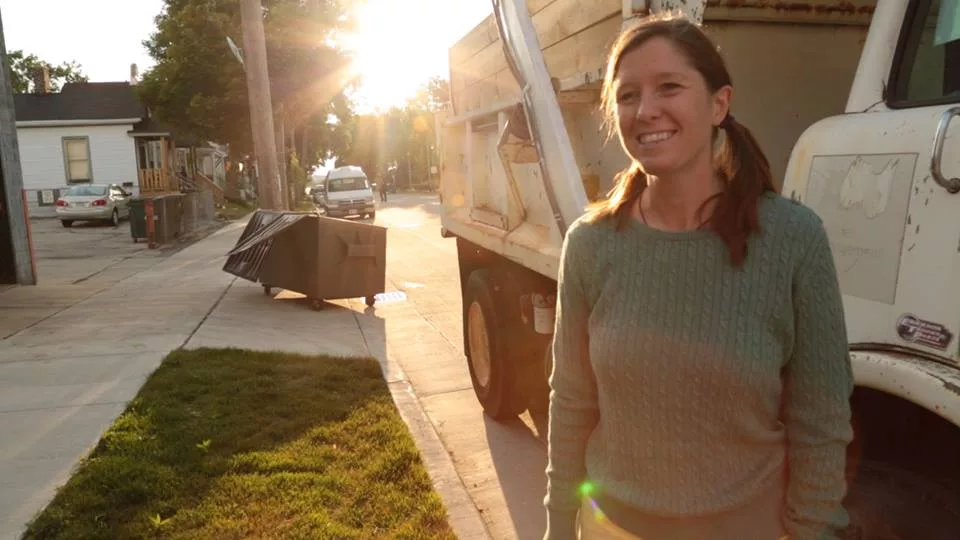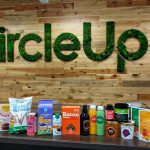Around 40 percent of the American food supply goes to waste. It’s not only the poor stewardship of resources that packs a punch: Organic waste is the single largest contributor to landfills today — and it’s responsible for the equivalent of 33 million cars’ worth of greenhouse gases.
Melissa Tashjian, Milwaukee waitress turned compost crusader, is on a mission to change that. She wants to divert 50 to 75 percent of the landfill waste stream by creating a separate organic recycling channel that goes straight to certified compost sites. And that’s not all: Her Milwaukee startup, Compost Crusader, is out to provide rich compost back to the community so it can be used to heal the earth and encourage local, sustainable, urban farming.
We sat down with Tashjian — one of the 2017 recipients of theEILEEN FISHER Woman-Owned Business Grant Program — to learn more about how she grew a part-time, volunteer, nonprofit effort into a fully-functional and profitable social enterprise, and why she believes everyone can be part of the solution.
You built Compost Crusader from a passion project into a profitable social enterprise. How did it all begin for you?
Melissa Tashjian: When I moved from one part of Milwaukee to another and lost my home compost bin, I made new friends. Together, we started a community garden with 120 raised beds. That’s when I realized how expensive quality soil is. At the same time, I was aware that our urban area generates a plentiful supply of food scraps that go to the landfill. Our solution? Create a community compost program to divert food scraps from the landfill and generate high-quality compost to fuel our new community garden.
Within two years, I found myself leading a volunteer-powered nonprofit. We created compost sites for local community gardens, where residents and businesses could drop off fruit and veggie material. For about five years, we transported and processed the raw material by hand, starting with five-gallon buckets and then graduating to a red wagon and a bicycle cart. Eventually, our group invested in a pick-up truck. I found myself working around 60 hours, unpaid, every week. And this was hard work.
As I studied how other states evolved their composting programs, I decided there was a more efficient way to divert more material with less effort. I partnered up with a local landscaping company that was in the process of converting into a composting business. This company was willing to accept all forms of food scraps — which represented a big step forward for us. In addition to fruits and veggies, we could now divert cooked meat, dairy, bread, grains, and other certified compostable material like compostable bags and to-go containers.
Those diversion practices add up and become a cost-neutral solution to landfilling. As consumers reduce what they send to the landfill, we’re able to reduce the cost associated with the service — and justify the cost of a compost program.
Why is the proper disposal of food waste everyone’s problem?

Frigid Milwaukee winters don’t stop Melissa Tashjian and the Compost Crusader team from collecting food scraps for reuse. (Image courtesy of Compost Crusader)
MT: I live in an urban environment, where we have many vacant industrial locations with contaminated soil. At the same time, there’s a huge push in Milwaukee to grow and buy local.
Abandoned warehouses can be transformed into opportunities for urban farming, and we need quality soil to do that. What we need to realize on a national — and even global — scale is that food scraps are the No. 1 cause of harmful greenhouse gases within a landfill. Due to their high moisture content, they also cause ground water pollution and contamination. Regardless of where any given individual stands on issues surrounding climate change, I think we can all agree that landfill space is not infinite — the more we reduce it, the better. In the US today, food scraps make up over 25 percent of landfill space. These landfills are expensive to create and maintain.
We recycle glass, metal, and plastic because, as a society, we realize those materials can — and should — be reused. To me, food scraps diversion is the next evolution in recycling. We can save precious space in our landfills, reduce harmful effects of the organic materials on the environment, and at the same time generate a beneficial byproduct: compost. It’s a no-brainer.
In an age when our natural soil has been depleted by harsh chemicals and over-farming, compost heals our planet. Top-soil is considered a non-renewable resource. Depending on where it forms, it can take from 100 to 500 years for one inch of topsoil to grow. Compost allows us to transfer much-needed nutrients back to the earth and to nourish our soil. Did you know that finished compost is also an important tool in storm water management? In recent years, we’ve witnessed the effects of flooding in many urban environments, and compost is a great way to create green infrastructure so that rainwater can be absorbed onsite.
How do you ensure the success of your community partnerships?
MT: One reason for our success is our dedication to education. We work with schools, restaurants, grocers, municipalities, and anyone else ready to make a positive impact in their community and environment by composting their waste.
We realize that we’re creating a new habit for a lot of people. Composting is a relatively new concept in the Midwest. People are genuinely excited to get on board, and we want to make sure they’re empowered to do that properly. We’re constantly working with area partners to promote and educate businesses and residents on how to properly separate their material. In fact, we’ve been so successful in those efforts that we had to morph from a nonprofit to a for-profit business model in order to keep up with demand, especially as the process gained in popularity with the local restaurant community.
Our secret sauce is simple: We work openly and honestly with each other, and we tackle new challenges together. Open and ongoing channels of communication are key. We like to think that, between Compost Crusader and the Milwaukee community, we’re going on this awesome adventure together. There will always be unknowns. But side by side, and hand in hand, we can work those challenges out as we face them.
What are some of the most important lessons you learned while building your business?
MT: Being a small business owner, I’ve learned a lot about my strengths and weaknesses. For example, I’m constantly trying to find that perfect and harmonious balance between my personal and business lives or identities.
Sometimes challenges come up and I may react in a certain way, only to later review the situation and think, “Do I want to be that kind of person?” For me, running a business has turned into a spiritual journey and voyage of self-discovery and growth. I evolve my management techniques to reflect the best version of myself that I can be at this given moment in time. It can be overwhelming at times, and I have to remind myself that my business is an extension of who I am as a person. On the downside, this means I often take my job too seriously.
Truth be told, we’re trying to solve a problem that is larger than us. No single small business will solve it single-handedly. Since we depend so much on the ecosystem we build with our community partners, getting buy-in from everyone requires patience and persistence. Persistence is no problem for me, but I’m working on patience!
What does “giving back” mean to you, and why do you feel social entrepreneurship is a good way to do that?
MT: I founded Compost Crusader because I wasn’t willing to wait for the big haulers to evolve to the next level. I’m not motivated exclusively by profit, but rather by results. I’ve found that profit is the result of hard work and dedication. I believe most social entrepreneurs are, like me, focused on the difference we can make in the long term. The thing is, at the risk of sounding cliché, something amazing happens when you give back to your community: It gives back to you.
Sometimes I feel the community does so much more for me than I do for them. It’s so rewarding for me to be Milwaukee’s organics hauler. Here I am, living my life and sharing my experiences, and the community is receptive. How many people get to say that about their jobs? I want to encourage others to share their experience and ideas in loving, non-judgmental ways: If you don’t speak up, then people will never know or understand how you’ve tweaked a process or are doing something just a little bit differently. By sharing, we inspire and empower one another.

Compost Crusader engages Milwaukee school districts to teach children about proper waste disposal. (Image courtesy of Compost Crusader)
How can we get kids involved in composting and cultivate good habits from an early age?
MT: Our focus for 2018 is, in fact, schools. Right now, we work with 20 school locations in five districts. We want to double that for the 2018-2019 school year, and we’re finalizing the curriculum and guides for school custodians and foodservice personnel.
Working with youngsters is so gratifying. The kids are excited to embrace new habits and teach their parents and peers. We’ve also discovered that many of the schools we work with weren’t recycling properly, so we work with teachers, students, and parents to empower everyone to properly source and separate their materials.
We explain why milk cartons go in the recycling bin, and how food scraps can be recycled into a nutrient-rich soil amendment. We have dynamic conversations about what a landfill is, where it’s located in their community, and why it should be considered a last resort. The schools even conduct waste audits so that students can see how their personal choice of where to put which material makes an impact on their community. They get to see first-hand how much recyclable material is going to the landfill, and they can work to help correct the habits of their peers and hold one another accountable.
How can businesses in your area — and around the country — help contribute to a tipping point when it comes to food waste diversion?
MT: I tell everyone to get involved in any way they can. You can compost yard material, as well as fruit and veggie scraps, in your backyard pretty easily. This is a great first step for a lot of people since every community is different, and the infrastructure needed to compost on an industrial or municipal level may not be readily available yet.
We need more people to talk about proper recycling — and food scraps are a part of that discussion. It drives me crazy when people say they’re throwing something away. What does that even mean? There’s no such thing as “away.” Everything goes somewhere. It’s that simple. The bins in which we place waste are representations of final destinations. We need to label bins in our businesses with “landfill,” “recycle,” and “compost.” That way, we start to move away from the “one-bin-fits-all” mentality that gets us into such trouble.
China is banning our recyclables because they’re not properly sorted and are oftentimes contaminated. The problem is usually at the source. It’s our personal, individual choices — as human beings and citizens — as to where we put material. And it’s time to do better. Together.
What are your top three leadership tips for social entrepreneurs?
Love what you do. If you don’t love it, you won’t succeed, because you will sometimes be the last to be paid, and you’ll often work the longest hours. Have your passion be your purpose and profit be the reward. To stay inspired, I surround myself with a lot of people who are smarter than me. I didn’t go to college, so I approach my business as common sense and constantly bounce ideas off people before I implement them. I take one day at a time, and I don’t overextend myself — even when I’m convinced that every idea I have is an awesome one.
Know your limits. Compost Crusader is my first business, and many people wanted me to grow really large, really quickly. I’m not comfortable taking that much risk or being in that much debt. It wasn’t a good fit for me or the lifestyle I live, so I’m scaling at my pace.
Bootstrap. There are so many great programs out there for social entrepreneurs. Eileen Fisher’s grant program is just one example of ways you can obtain funding without taking investments and giving up equity. Research all local and national opportunities before you go to the bank for that $10,000 conventional loan. There’s another way.




